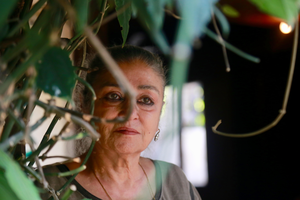BILKULONLINE
By Sukant Deepak
New Delhi, Dec 2: The language is alien. The stories are not. The accents are distinct, the bodies and their rhythms — familiar.
As Manto’s six stories come alive on stage and a few minutes pass, the ears stop straining. Images take over and sounds resound. Text is no longer the centre. Those imaginative enough are allowed to make their own stories as bodies move, and physical and emotional patterns emerge. Partition, intrigue, hopelessness, exploitation, perversion, a small crack in the clouds…. theatre director Neelam Mansingh Chowdhary’s latest production ‘Tamasha’ operates on different planes, in diverse labyrinths.
However, when Chowdhary, recipient of the Padma Shri honour, works with students from Kerala on six stories by Manto, a parallel drama is also enacted.
The actors do not speak her language, she does not understand theirs. Only one actor is fluent in English who translates her instructions to others. But there are no disjoined collages, only an effortless imagination — of the director, actors and the audience.
With the play is also born a new idiom of connection. The ‘other’ melts with the one on stage. During rehearsals, she senses when the tone is incorrect, when sounds are not in step. One month later, both dramas come together. But what still suspends in the air is an enigmatic space of not knowing. No, imagination is a better word.
It all started when the maverick theatre director Abhilash Pillai, also the director of School of Drama & Fine Arts, under Calicut University in Kerala approached Chandigarh-based Chowdhary to prepare a production with students from the university, in her distinct style and explore Manto’s works which are not as popular in that part of the country as the North.
“Neelam has always been an inspiration. I may have watched all her works, but there is one scene that never leaves my mind — of red ink being splashed on a white cloth… something that continues to affect me. I have been watching her reach during workshops and productions in Calicut and NSD, where I taught before moving here. Her unique ability to transcend structures and destroy boundaries lend new meanings to productions. As the head here, I want students to get exposure to world-class directors and experience their style and approach. Also, it made a lot of sense that the students travelled to her city, away from their own structured life, and immersed themselves in her world, and the one of her making,” Pillai tells.
Adding that the play would be perfect for Kerala, considering the director derives from both traditional and contemporary, he feels Manto’s stories need to be told and retold in the times we live in currently where physical, emotional and spiritual savagery of Partition continues to live on.
Working with another language is however not something very new for Chowdhary. A few years back, when she did a production in Japan, the cast and crew included members from across Asia — China, Thailand, Japanese and Punjabi.
“There was an interpreter there, but not here. However, my co-director Rocky and I have worked out a system. But then we should not ignore the fact that language is just one area and element. In theatre-making, multiple elements, including objects, visual imagery, sound, and several other dimensions come into play. And because I am so familiar with Manto and have worked with his text before, I asked the actors to share and explain each line, and what it means so as to ensure that the complexity and multiple layers the writer operates on are not lost. It is always important that the work is not linear, and offers diverse possibilities,” she says.
Adding that she wanted the actors to select and claim the stories as their own and understand them through their own experiences of loss, grief and trauma; otherwise the play would not work, the director adds that though the stories looked like different sections initially, however, many knots were untangled so as to ascertain a cohesive production.
When it comes to audience members unfamiliar with Malalayam, she asserts that ‘understanding’ is a comforting space but the act of delving into the unfamiliar constantly provides new insights.
“I prefer that the viewers develop their own narrative. Why force the audience to see the play the director has conceived it? That will take away the agency of the audience.”
For actors Garggi Ananthan, Shibil Paravath, Aswathy Raj, Sarath Meraki and Subin KK (light design and stage manager), it has been a month of unlearning and learning. From adapting a new approach to theatre-making to spending nights reading stories together, the experience has not only been about understanding Manto but pushing newer boundaries.
Selecting the stories that touched them the most and then improvising them, all of them remember that from the first day onwards they were encouraged to improvise and bring forth their own perspectives.
“Yes, we were nervous before the project considering it was a completely alien territory. None of us had any experience of working with a different language and approaching text in the way we did. But slowly, things unraveled, connections were made with the writer and the director. Quietly, a new language emerged which the audience in Kochi will witness on December 6 and 7,” says Ananthan.
